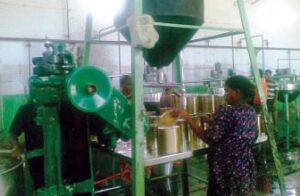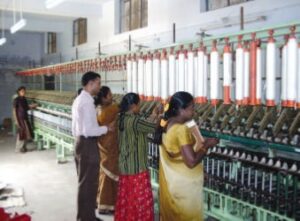As a response to the inefficiencies in the present marketing system and to enable farmers, especially the small and marginal farmers to receive a fair price to their produce, resulting from economies of scale, FPOs are being promoted. Besides the push for forming FPOs, it is also important to support these FPOs financially and in empowering them, so that they sustain over a longer period.
Decades of Low External Input Sustainable Agriculture (LEISA) campaign struggle was recognized when the Government of India launched National Mission on Natural Farming (NMNF), by the end of 2022, probably due to 3 pushes- a) National/ global talk about Zero Budget Natural Farming (ZBNF, https://zbnf.org.in) promoted by an off-beat farmer leader Shri Subhash Palekar ji of Amaravati district, Maharashtra state, who emphasized on non-purchased, only farm-made organic inputs. He argued that purchased organic inputs such as vermi-compost are costly and unsuitable for majority (80%) of Indian famers who are small and marginal. b) Spread of ZBNF technique to over 6 million farmers and 8 million hectares by 2022 under the able leadership of ex Additional Chief Secretary (Agriculture) Shri T. Vijay Kumar (IAS, retd.), under the programme, Andhra Pradesh Community Natural Farming (https://apcnf.in) leading to the launch of Indo German Global Academy for Agroecology, Research and Learning (IGGAARL) in the YSR Kadapa district, Andhra Pradesh (Fuchs, 2022). c) Rising cancer incidence in cities, rising farmers’ suicides and national debate on viability of agro-chemicals and hi-input farming, increasing demand for organic or pesticide-free crop produce for export, that to make farming viable given the ever-growing farm surplus.
The organic production area in India is about 5 million hectares of farmland by 2023 despite its start about 20 years ago. The speedy growth of natural farming in Andhra Pradesh is amazing. This could be owing to cost reduction and small farmer appeal, besides incentives such as subsidy of Rs. 10,000/ ha to widow women farmers to help promote ecological/ regenerative agriculture.
Natural certification and testing
While cost reduction is point of attraction for small farmers to move towards natural farming, its viability or sustainability is a tightrope walk without price premium, due to the increased labour cost/ effort. Making botanical extracts, humus cropping, livestock rearing are laborious and some farmers are discouraged by it today while hiring labour is expensive. Organic products get 20-40% premium price especially in the export segment or amidst shining mall in the metros India wide. Natural farming will get boost if such price premium is available to it also, through PGS certification. Some buyers voluntarily offer 10% premium to APCNF crops viz. Tirupati Tirumlala Devesthanam (TTD) Trust. But its wider replication country wide, will require strengthening of the PGS, nationally, as done in APCNF.
Secondly, the evaluation studies of APCNF done by Centre for Economic and Social Studies, Hyderabad and University of Reading, U. K. have concluded that improved farm ecosystem can be achieved but not increased yield, as it is not the goal of the effort. And the big challenge is that quality improvement of the produce such as lower pesticides residues is not measured or rewarded by better price. Actually, pesticide or heavy metal residue tests cost Rs. 1,000-1,500/- conducted by NABL accredited laboratories such as Anacon laboratories, Nagpur. Even KVKs (Krishi Vigyan Kendras) in all districts can be equipped to conduct these tests to endorse the low chemical input claim.
FPOS for marketing success
Marketing is the touchstone of farming. Farmer cannot sustain without fair returns to his crop produce. Small, poor, less educated farmers find it hard to handle the market inequality and exploitation. In response to this, the Government has promoted Farmer Producer Organisation (FPO) or Company (FPC) since 2002. FPO can ideally help natural farming community by aggregating their produce and sell it in local or metro or inter-state or export market and provide fair share of about 60 to 70% to the farmer. Many first generation FPOs have done this and have a turnover ranging from Rs. 1 to 10 crore and benefitting 1,000 to 10,000 (one to ten thousand) farmers. These include Aahram Traditional Crop Producer Co., Madurai, Chetana Organic, Hyderabad, Sahaja Organic, Bangalore and Sahaja Seeds, Mysore, Timbaktu Collective, Anantpur etc. Those promoted by incubators such as ASA, Access Livelihood Services, BASIX, BAIF, Centre for Collective Development, IMMA, IRMA, PRADAN, Srijan, WOTR and Vrutti, are among others who have been fairly sucessful.
Box 1- Differences in organic & Natural Farming
|
Organic farming popular practices 1) Vermicompost sheds & culture 2) Plastic mulching is not discouraged 3) Microbial inputs- Azotobactor, Rhizobium, Trichoderma etc. 4) Third party costly certification 5) Often practiced by rich, irrigated farmers 6) Tractor is commonly used |
Natural Farming principles 1) Wafsa (humus)* 2) Leaf Mulching 3) Jeevamrut, Bramhastra etc.as growth promoters/ protectors# 4) PGS- participatory guarantee system** low cost certification 5) Small, dryland farmers adopt it, 6) Bullocks are preferred to plough |
*Soil organic matter (carbon, besides moisture) is improved through pre monsoon dry seeding (PMDS) of fast growing legume crops such as cowpea, Sesban (Dhaincha) or Roselle (Ghingura) etc., to mix with soil in 1 month just before soil.
**- its farmers’ per group review based system.
#Jeevamrut- cow dung, cow urine, jiggery, pulses flour & virgin soil (microbial inoculum).
Bramhastra- Cow urine, leaves of Neem, Custard apple, Guava, Papaya, Pomegrenate, Datura, Lantana etc.

mango processing
FPO is autonomous unlike the cooperatives that dominated the 20th century. FPOs are promoted by the government to promote farmer’s livelihood improvement by better marketing and organisation. NABARD has launched massive target of 10,000 (ten thousand) FPOs in 2018, countrywide. However, as per the strategy paper prepared for this ambitious scheme, of the about 5,000 FPOs existing then in the country, vide information collated from NABARD (2,086), SFAC (902), other Govt. agencies (641) & others (1,371), only 30% were found viable. About 20% were struggling to survive and 50% were just beginning- mobilizing farmers, gathering funds etc. There is just one FPO crossing Rs. 100 crore/ year turnover as highlighted in Box 1. The outreach of all the FPOs together is about 22 lakh i.e. 2.2 million. This is only 1.7% of the FPO upscaling required to cover 12 crore farmer families in the country.
|
Box 1: Sahyadri FPO After 20 years of making law to this effect, there is perhaps just one FPO to cross Rs. 100 crore/ year turnover viz. Sahyadri Farmer Producer Company Ltd., (https://www.sahyadrifpc.com), Nashik, Maharashtra State. It was started in the year 2010 and is presently having 18,000 members. IT conducts business in 9 crops, topped by Grapes. It began by exporting Grapes and is marketing its 18 varieties today. Other crops include tomato, pomegranate, banana, sweet corn, mango, citrus (orange and sweet lime), and cashew. Its success mantras can be shortlisted as (a) Solid products, (b) upmarket target (export), (c) commercial management (efficiency/ rigour as against charity/ soft approach). It attracted a record Rs. 310 crore ($40 million) European investment in 2022. |

yarn mill
Way ahead
FPOs need support from the Government either directly or through “public procurement” provision like it buys meals/ food grocery etc., from women self help group (SHG). In a bid to support FPOs, recently, the Government of India announced “Bharat Organic” brand at the National Symposium on Promotion of Organic Produce organised by the National Cooperative Organics Limited (NCOL) at New Delhi on 8th November 2023. NCOL, established under the Multi State Cooperative Societies Act, 2002 facilitate production, distribution and marketing of certified organic products and prove to be a milestone in the cooperative and agricultural sectors, benefitting future generations. The five promoters of NCOL include reputable institutions such as NDDB, GCMMF, NAFED, NCDC and NCCF. Six organic products are launched under the ‘Bharat Organics’ brand. 20 organic products will be launched soon. While prices of organic products are higher, Bharat Organics will market them at a lower price than existing organic products. NCOL will deposit 50% of the excess realisation in the bank accounts of farmers directly, which will benefit farmers by increasing their income.
Government can also invoke FPO mentors such as Samunnati. Recent introduction of ITC to FPO strategy by SFAC etc., can also be of help. Also there is a need for FPO support from Corporate Social Responsibility (CSR) – financially, providing commercial guidance and through market assistance.
References
APEDA, National Programme for Organic Production (NPOP), 2023, https://apeda.gov.in/apedawebsite/organic/organic_products.htm#:
Fuchs S. Indo-German Academy to promote Natural Farming launched, Embassy of Federal Republic of Germany, New Delhi, 2022, https://ipr.ap.nic.in/images/press-releases/German%20Embassy%20Press%20Release%20Indo%20German%20Academy%20for%20Natural%20Farming%20launched.pdf
NDDB, Organic farming to bring prosperity to farmers; NCOL to play crucial role: Shri Amit Shah, Hon’ble Union Minister of Home Affairs & Cooperation, 2023, https://www.nddb.coop/node/2423.
SFAC, Strategy Paper for promotion of 10,000 Farmer Producer Organisations (FPOs). Small Farmers’ Agribusiness Consortium (SFAC), New Delhi (http://sfacindia.com/) 2019.
Shagun, Andhra Pradesh extends support to SC women farmers for natural farming push, 2022, https://www.downtoearth.org.in/news/agriculture/andhra-pradesh-extends-support-to-sc-women-farmers-for-natural-farming-push-81284
Utkarsh Ghate
Ecologist,
BAIF Development Research Foundation, Pune
Email: ughaate@gmail.com









